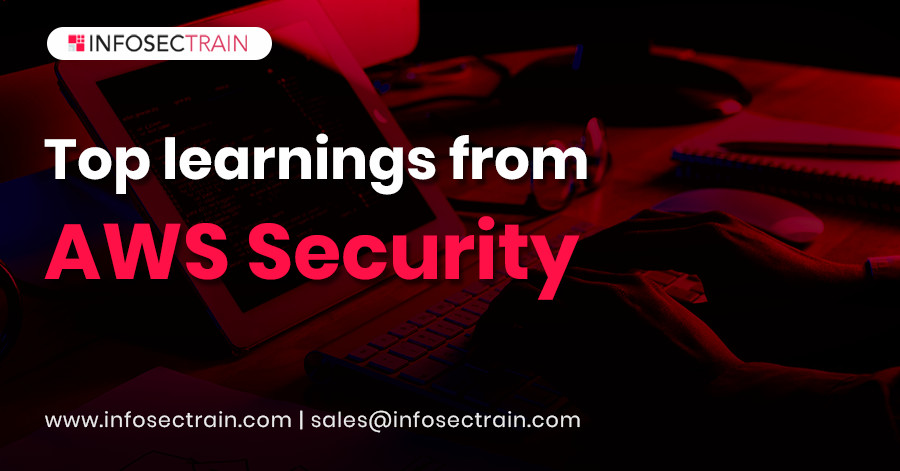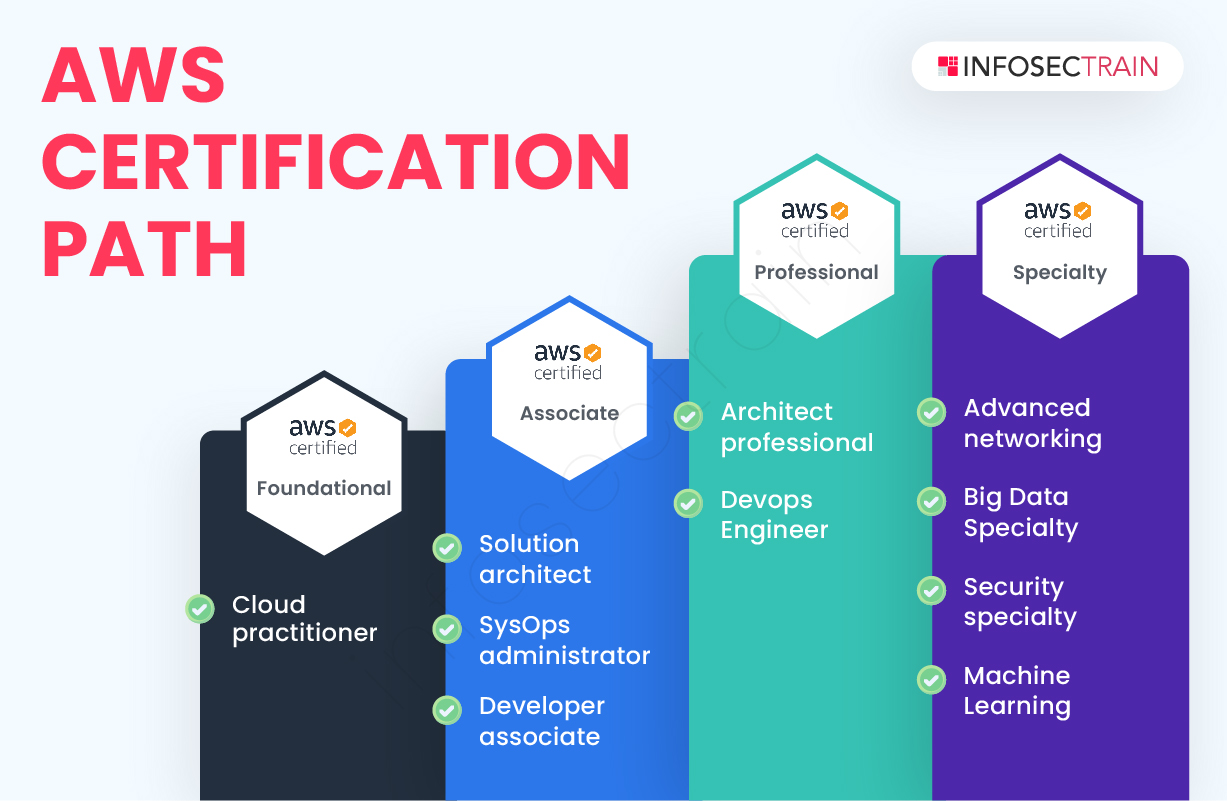Top learnings from AWS Security
It’s presumably nothing unexpected that security is one of the most popular game plays in the IT industry. In the age of cyberwarfare, security is the most important aspect of any organization or an individual. It’s likewise profoundly imperative to our clients and any organization thinking about moving to the cloud. Cloud technology is exponentially growing, and as it acquires the market, the need for securing it from breaches and vulnerabilities grows proportionally. The AWS Certified Security – Specialty certification concedes expert cloud security specialists to verify and certify their understanding of securing the AWS domain. This examination is designed for peers who perform a security role in an organization. It authorizes a candidate’s ability to adequately express knowledge of how to secure the AWS platform.

Path to AWS Certified Security Specialty
There are four levels of AWS Certifications. It starts with the Foundational level, followed by the Associate level, Professional level, and Specialty level. The ‘AWS Certified Security Specialty’ falls under the Specialty certification level. The various certifications under each level are:
- Foundational certifications: The ‘AWS Certified Cloud Practitioner’ certificate is the initial certification that does not demand any prior experience. An essential comprehension of AWS cloud administrations is adequate to take this certification program.
- Associate certification: The Associate level certifications are followed by ‘AWS Certified Solution Architect’, ‘AWS Certified SysOps Administrator’, and ‘AWS Certified Developer Associate’.
- Professional certification: The certifications that are at the professional level are ‘Solution Architect Professional’ and ‘AWS Certified DevOps Engineer’.
- Specialty certification: The certifications that fall under this category are ‘AWS Certified Advanced Networking’, ‘AWS Certified Security Specialty’, ‘AWS Certified Machine Learning Specialty’, ‘AWS Certified Alexa Skill Builder’, ‘AWS Certified Database Specialty’, and ‘AWS Certified Data Analytics Specialty’.

Benefits of AWS Security Specialty Certification
The AWS Security Specialty certification is one of the first Security certifications from AWS and comes with a lot of benefits. Some of its benefits are:
- It provides you with a sound knowledge of the security domain of AWS infrastructure.
- It provides you a greater level of understanding of specialized data classifications and AWS data protection mechanisms.
- It provides knowledge of data-encryption methods and AWS mechanisms to implement them.
- It provides insight into secure Internet protocols and AWS mechanisms to implement them.
- It renders the practical experience of AWS security services and features of services to provide security of the production environment.
- It lets you gain competency from two or more years of production deployment experience using AWS security services and features.
- It provides you an ability to execute tradeoff conclusions with regard to cost, security, and deployment complexity given a set of application specifications.
- It gives you an in-depth knowledge of security operations and risks.
- Candidates with this certification add more value to their organization than their co-workers.
- It is one of the top 10 most popular cybersecurity certifications of 2020.
Objectives of the exam
The AWS Security exam not only validates your knowledge of the security study, but it also provides:
- A comprehension of particular Data Classifications and AWS Data Protection Mechanisms: Data Classification is an essential approach in Cybersecurity Risk management. It includes distinguishing the kinds of data that are being handled and stored. AWS offers a few services and assistance that can encourage the organization, implementation of data classification, and protection mechanism.
- A comprehension of data-encryption strategies and AWS mechanisms to execute them: Data protection ensures the protection of data while in transit and data at rest. You can secure data in transit by adopting SSL or by using client-side encryption. Be that as it may, you have different choices to ensure the protection of data at rest and in transit using AWS services.
- A comprehension of secure internet protocols and AWS mechanisms to perform them: While reaching out to AWS resources for data transmission, you must use HTTPS rather than HTTP for better communication security. HTTPS uses SSL or TLS protocol, which uses public-key cryptography to prevent eavesdropping, tampering, and forgery. You have to get accustomed to these protocols and their implementation with various AWS services.
- Working familiarity with AWS security services and features of services to provide a secure production environment: It is essential to play out certain active labs or practices when you prepare for the exam. Half of the exam questions will focus on low-level technical details or implementation. It will be hard to answer them without any hands-on experience.
- Competency picked up from at least two years of production deployment experience using AWS security services and features: This is like the former objective but focuses more on production implementation expertise. When we talk about production, it is more enthralled on incident response monitoring and logging domains.
- Intelligence to perform tradeoff choices concerning cost, security, and deployment complexity is given a set of application obligations: This goal is more centered on testing our ability to make decisions depending on the selected design solutions against security and cost. Sometimes your design might be a cost-effective design, but it may not fulfill the security requirements, or you may have the best solution to address the security requirements, but it may not fall under your operational budget. So, when you design a solution, you must consider other requirements such as cost, security, resource, and complexity of your solution.
- Comprehension of Security operations and risks: Although governance risk and compliance are considered discrete functions, there is a relationship. Governance establishes the strategy and control for meeting specific requirements that align and support the business. Risk management interfaces explicit controls to the governance and evaluates risk, and provides business leaders with the information they require to make the decisions. It is a more functional area to focus on, which spreads across all exam domains.
Recommended AWS knowledge
Here are some of the recommended requirements and prerequisites, but these are not mandatory.
- A minimum of five years of experience in the IT security domain designing and implementing security solutions
- At least two years of experience in securing AWS workloads
- Knowledge of implementing security controls for workloads on AWS
Exam details
Exam Pattern: Multiple Choice, Multiple responses
Duration: 170 minutes
Number of questions: 65
Passing score: 750 out of 1000
Domains of Security Speciality
The AWS Security Specialty certification deals in five domains
Domain 1: Incident Response (12%)
- Assess suspected compromised instance and exposed access keys
- Validate that the Incident Response plan include relevant AWS services
- Assess configuration of automated alerting, and execute possible remediation of security-related incidents and emerging issues
Domain 2: Logging and Monitoring (20%)
- Design and implement security monitoring and alerting.
- Troubleshoot security monitoring and alerting.
- Design and implement a logging solution.
- Troubleshoot logging solutions.
Domain 3: Infrastructure Security (26%)
- Design edge security on AWS.
- Design and implement a secure network infrastructure.
- Troubleshoot a secure network infrastructure.
- Design and implement host-based security.
Domain 4: Identity and Access Management (20%)
- Design and deploy a scalable authorization and authentication system for accessing AWS resources.
- Troubleshoot the authorization and authentication system to access various AWS resources.
Domain 5: Data Protection (22%)
- Design and implement key management
- Troubleshoot key management
- Create and implement a data encryption solution for data at rest and data in transit.
AWS Security Specialty with InfosecTrain
You can join the AWS Certified Security – Specialty Training (SCS-C01) for professional knowledge and an in-depth understanding of Cloud security. We are one of the prominent training providers with our well-read and experienced trainers. The courses will help you understand the basic concepts and provide a sound knowledge of the subject. This certification will truly merit each penny and minute you have invested.







 1800-843-7890 (India)
1800-843-7890 (India)